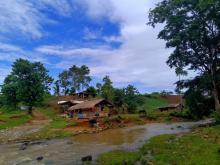MANILA - The Philippines is one of the 17 megadiversity countries on the planet. In terms of biocultural diversity and natural resources, it is an Ali Baba's cave. But not for much longer. Its biocultural heritage is being destroyed on a massive scale by mining, biofuel plantations and illegal deforestation. Sand mining, dredging and land reclamation are also contributing to this destruction.
Widespread corruption, extreme poverty, conflicting legislation, political inertia and mismanagement are exacerbating the exploitation. Peter Dupont set out to investigate the complex reality behind the destruction. He focuses on three key commodities in the Philippines, a country of migration: timber (deforestation), sand (magnetite mining) and people (slavery, cyber prostitution). The hunt for timber, sand and flesh has resulted in a migration flow to the overpopulated megalopolis of Metro Manila, which, according to the 2013 Climate Change Vulnerability Index, is the second most vulnerable capital city in the world.
In Metro Manila, the journalist spoke with politicians, companies, organisations (including 11.11.11 and Palamakaya) and other actors. In the north of the largest island, Luzon (Cagayan province), he visited the plundered beaches and oppressed indigenous peoples (Agta). In the Northern Sierra Madre Natural Park (Isabela province), he observed the death of the last remaining indigenous forest. In Tacloban (Leyte), he saw the deadly consequences of mangrove forest clearing and political corruption. In Manila, Cebu and Mindanao, he investigated the increasingly tight grip of cyber prostitution on communities.
He also highlights the heroic struggle of a few individuals and organisations who have made it their life's work to turn the tide. Among them are environmental priest Jan Couvreur (Quirino), Julie Flores, coordinator of the Payoga cooperative (Gamu), environmental activist Esperlita Garcia (Gonzaga), biologist Merlijn van Weerd (Mabuwaya San Mariano) and Ignacio Taruc (mayor of Buguey). All of these people are fighting with unequal weapons, often against their better judgement and with minimal support.
Photo's: © Peter Dupont
PRINT/ONLINE
- Sand Wars, Coastal Care, 13/03/2014.
- Zandoorlog, EOS, 14/10/2013
- Zorgt massale zandroof voor tweede Haiyan?, P-magazine, 21/01/2014.
- Jan De Nul wil P-magazine uit de rekken halen, Het Nieuwsblad, 22/01/2014.
COUNTRY
- The Philippines




